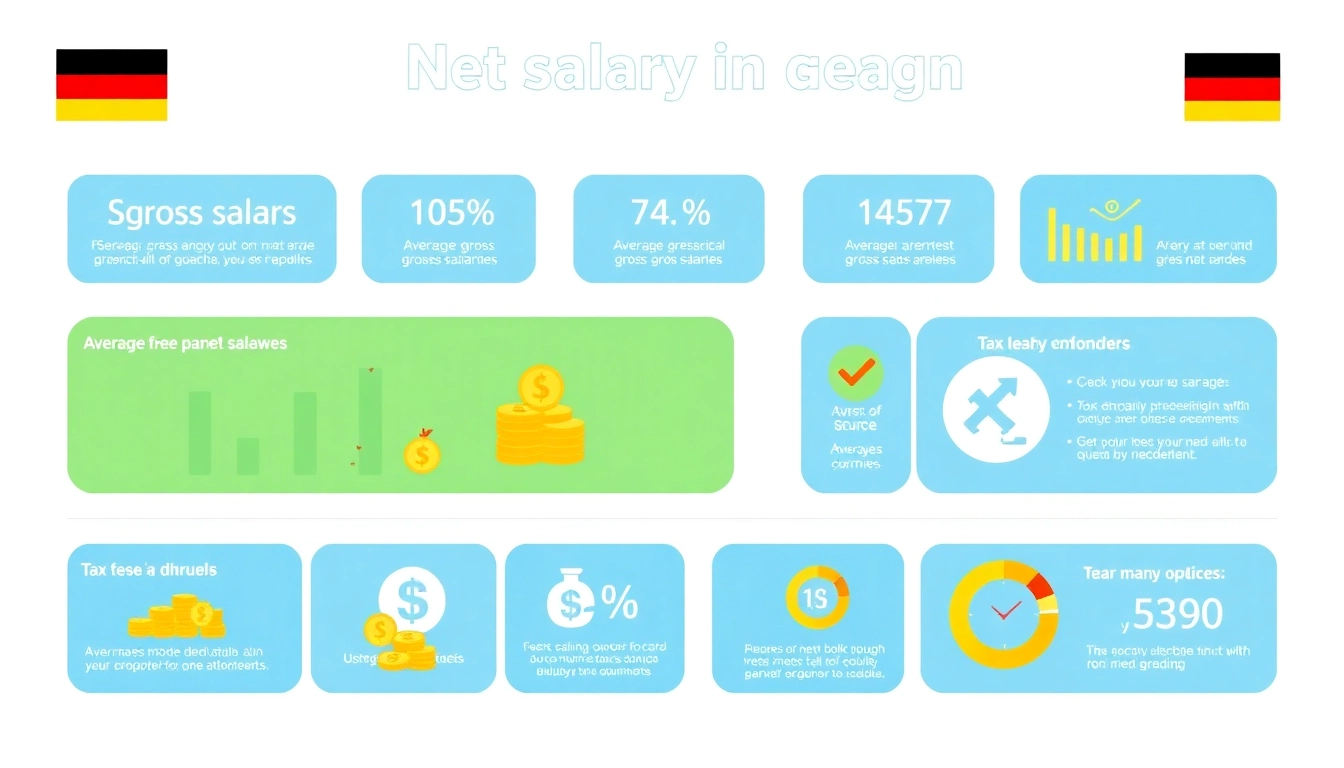Understanding Net Salary in Germany
When considering a career move to Germany or simply trying to understand the financial landscape of the nation, one crucial concept that frequently arises is the net salary in germany. Understanding what constitutes net salary, how it is derived, and why it holds such significance is essential for anyone looking to manage their finances effectively in Germany.
What is Net Salary?
Net salary, often referred to as „Netto“ in German, is the amount of money that an employee retains after all mandatory deductions have been made from their gross salary. It is the actual take-home pay that an individual receives, which is crucial for budgeting and financial planning.
How is Net Salary Calculated?
The calculation of net salary in Germany involves several critical steps and factors:
- Gross Salary: This is the stated salary before any deductions (taxes, social security, etc.). For example, if a person earns a gross salary of €50,000 annually, this is the starting point for all deductions.
- Income Tax: Germany has a progressive tax system where tax rates increase with income. For 2024, income up to €11,604 is tax-free. For amounts above this threshold, the tax rate starts at 14% and can go up to 45% for high incomes.
- Social Security Contributions: Employees typically contribute towards various social security schemes, including health insurance, pension insurance, unemployment insurance, and long-term care insurance. These contributions can amount to approximately 20% of a worker’s gross salary.
- Health Insurance: Health insurance premiums are a significant component, with statutory health insurance averaging around 14.6% of gross salary, split between employer and employee.
- Net Salary Formula: The basic formula to calculate net salary is: Net Salary = Gross Salary – Income Tax – Social Security Contributions – Health Insurance.
Why Net Salary Matters
Understanding net salary is vital for several reasons. First, it provides clarity for financial planning; it’s the actual amount individuals can expect to receive and use for living expenses. Second, net salary can impact lifestyle choices, housing options, and overall financial stability in Germany’s diverse economic landscape. Furthermore, it can vary based on factors like tax class, marital status, and number of dependents.
Average Salaries in Germany
To grasp the context of net salary within Germany, it is important to look at the average salaries across different sectors and regions.
Current Gross Salary Trends
As per the latest statistics, the average gross salary in Germany is around €53,748 annually or approximately €4,479 per month. This figure may vary based on the type of job, geographic location, and industry specifics.
For entry-level positions, salaries tend to start lower, around €30,000 annually, while professionals with several years of experience can earn well above the national average.
Net Salary Comparisons Across Regions
Germany is divided into several different regions, each with distinct economic climates that can affect average salaries. For instance:
- Bavaria: Typically has higher salaries, especially in cities like Munich, with an average gross salary of €56,000.
- Berlin: A hub for startups and the tech industry, with average salaries around €50,000.
- North Rhine-Westphalia: Another significant economic region, where the average gross salary lies around €52,000.
Regional averages highlight how location plays a pivotal role in salary determination, leading to variances in net income.
Salary Insights by Industry
Different industries also exhibit varying salary ranges. Below are some examples of average salaries in key sectors:
- Information Technology: Gross salaries can range from €50,000 to €80,000 and above depending on expertise and roles.
- Healthcare: Physicians tend to earn between €60,000 and €120,000, while nurses can expect around €36,000 annually.
- Engineering: Engineers in Germany typically earn between €45,000 to €75,000 per year.
These industry-specific figures demonstrate how experience, skill, and sector can impact one’s net salary significantly.
Tax Implications on Net Salary in Germany
Another crucial factor influencing net salary is the tax landscape in Germany. Understanding how taxes work is fundamental for expatriates and locals alike.
Overview of German Income Tax
The German tax system operates on a progressive scale; therefore, the more you earn, the higher your tax rate. In 2024, the tax brackets apply as follows:
- 0% for income up to €11,604
- 14% for income from €11,605 to €57,918
- 42% for income from €57,919 to €277,825
- 45% for income over €277,826
It is essential to calculate taxes based on your expected annual income to accurately determine your net salary.
Social Security Contributions Explained
Beyond income tax, employees must contribute towards various social security schemes. The key components of social security contributions include:
- Pension Insurance: Roughly 18.6% of gross income, shared between the employer and employee.
- Health Insurance: As mentioned earlier, contributes around 14.6% of gross salary.
- Unemployment Insurance: Approximately 2.4%, again shared between employers and employees.
- Long-term Care Insurance: About 3.05% for individuals, with additional contributions for childless employees.
These contributions are essential for social welfare but should be factored into budget considerations when analyzing net income.
How to Reduce Your Tax Burden
Reducing tax liability is a goal for many individuals. Here are a few strategies that can help in effectively managing your tax burden:
- Use Tax Deductions: Identifying applicable deductions such as professional expenses, work-related costs, and certain personal expenses can lower taxable income.
- Consider Tax Classes: Marital status and number of dependents can affect the tax class you fall under, which in turn influences tax liability.
- Maximize Allowable Contributions: Contributions to retirement plans or health savings accounts may provide tax advantages.
- Review Benefits: Evaluate any employer benefits that may have tax implications, such as clothing allowances or transportation support.
Understanding and utilizing these strategies can lead to significant savings, potentially increasing your take-home pay.
Net Salary for Foreign Workers in Germany
For expatriates or foreign nationals planning to work in Germany, there are additional considerations regarding net salary.
Understanding Expat Taxation
Foreign workers in Germany are subject to the same income tax laws as locals, but there are some exceptions based on tax treaties and agreements between Germany and other countries. It’s important to seek clarity on:
- Tax residency status
- Potential for double taxation exemptions
- Deductions available for expats, which can differ from resident workers
Insights from tax professionals can be invaluable to maximize net income and legal compliance.
Permits and Residency Impact on Salary
Work permits and residency status can impact an expatriate’s net salary. The duration and type of work permit may influence salary negotiations or benefits offered by employers. Potential differences include:
- Offers of relocation assistance for non-EU citizens
- Variations in salary based on nationality and skill level
Addressing these factors upfront can aid in more transparent compensation discussions with prospective employers.
Benefits and Challenges for Expats
While working in Germany offers many benefits, such as a high quality of life and strong economic stability, expats face unique challenges, including:
- Language Barrier: Proficiency in German can significantly impact job opportunities and salary levels.
- Cultural Differences: Understanding workplace culture and expectations is essential for effective adaptation.
- Integration into the Social Security System: Familiarity with local regulations regarding health insurance and retirement savings is critical.
Employers often provide support for integrating into the local environment, which can help alleviate some challenges faced by expatriates.
Tools for Calculating Net Salary in Germany
With numerous variables affecting net salary, having reliable calculation tools is indispensable for employees. Here are several resources and methods for accurately estimating net income.
Using Online Salary Calculators
Various online tools are available that allow individuals to calculate their net salary based on gross income, tax class, and social security contributions. Notable calculators include:
- German Income Tax Calculator: This tool provides an estimate of net salary after inputting gross income.
- Online Gross-Net Calculators: These calculators can account for various factors, including local tax rates and social contributions.
Using these will provide a clearer picture of potential take-home pay.
Estimating Your Net Income Accurately
To estimate net income more accurately, consider the following factors:
- Input your expected gross salary based on industry standards.
- Account for any additional income sources or irregular bonuses.
- Be mindful of your personal circumstances regarding tax class, marital status, and dependent children.
These considerations can affect net income significantly.
Common Mistakes in Salary Calculation
When calculating net salary, it’s easy to make errors that can lead to unrealistic expectations. Common mistakes include:
- Neglecting to update tax class information when life changes occur (marriage, children).
- Forgetting about local taxes that may apply in specific regions.
- Not accounting for all social security contributions accurately.
Ensuring comprehensive checks are made can lead to better planning and financial understanding.




